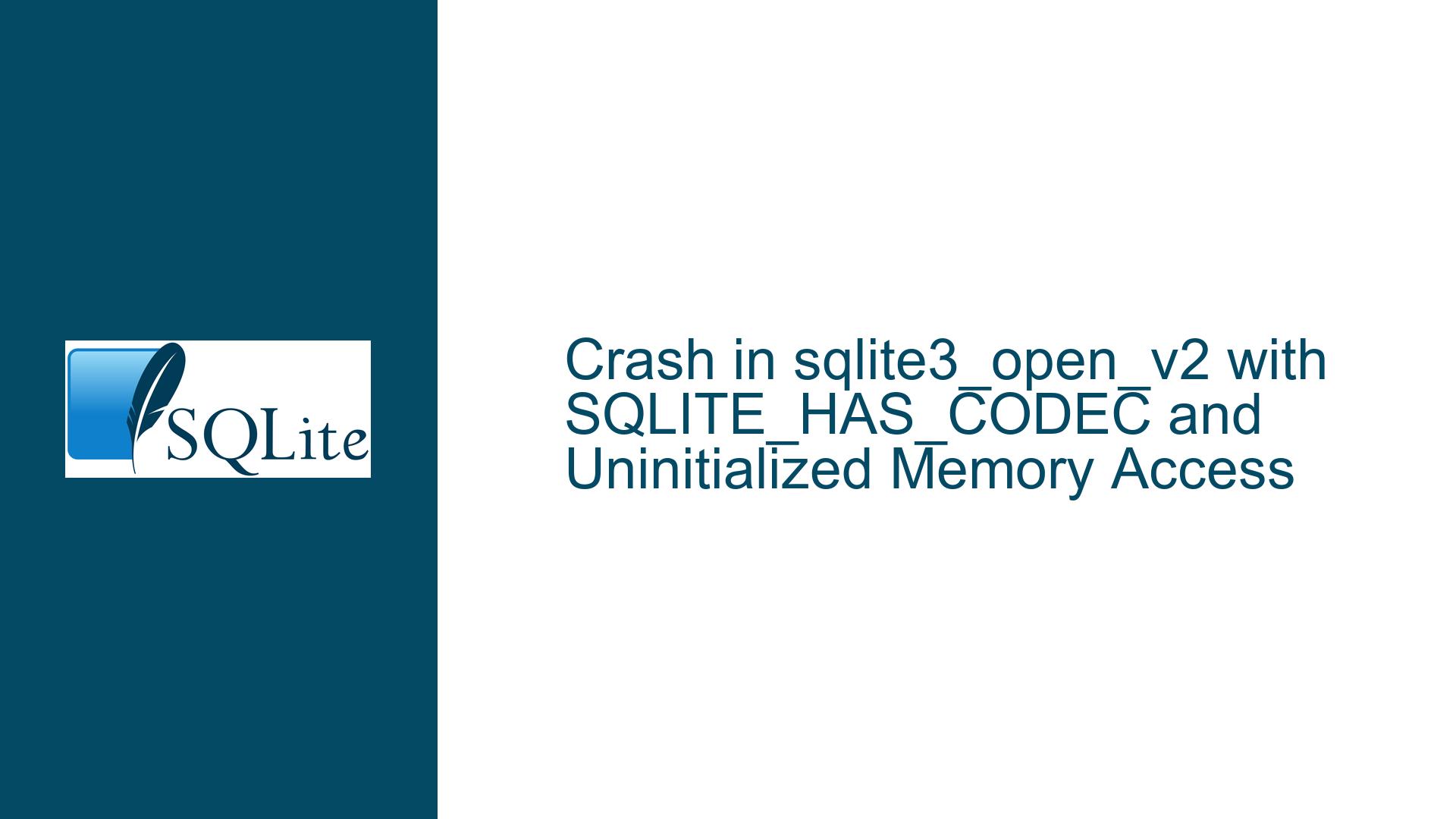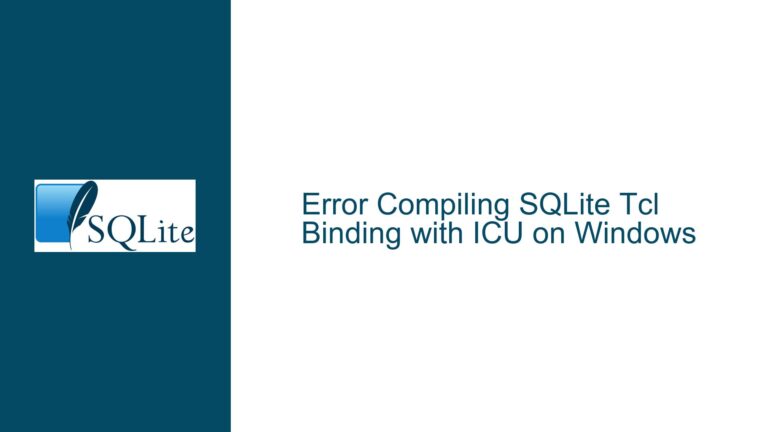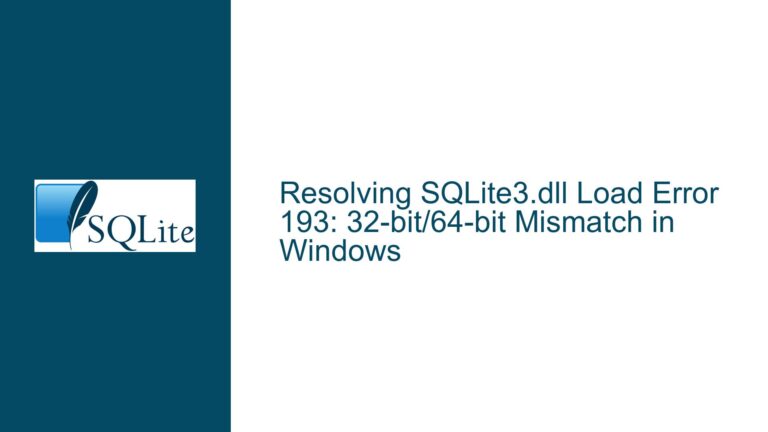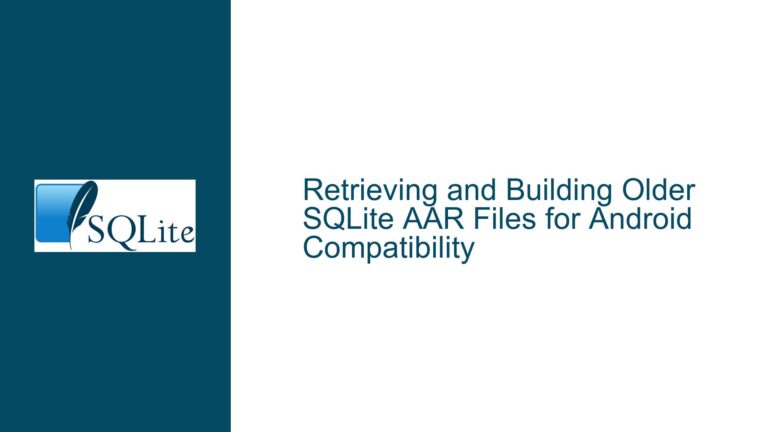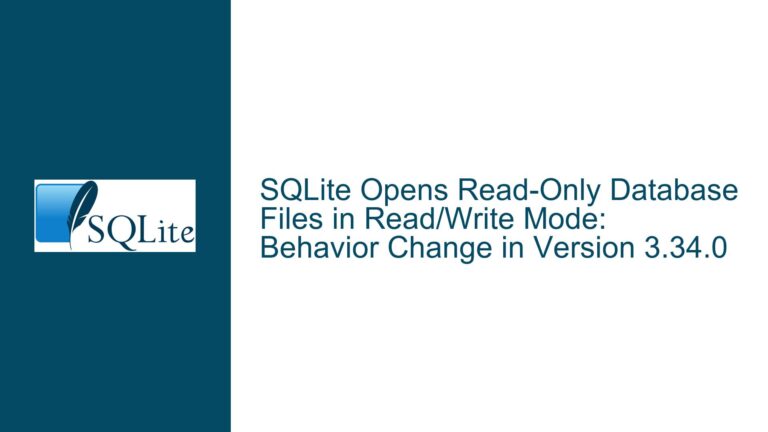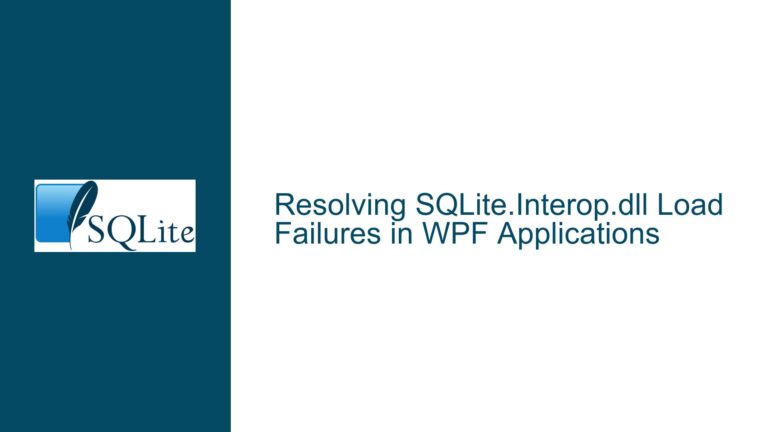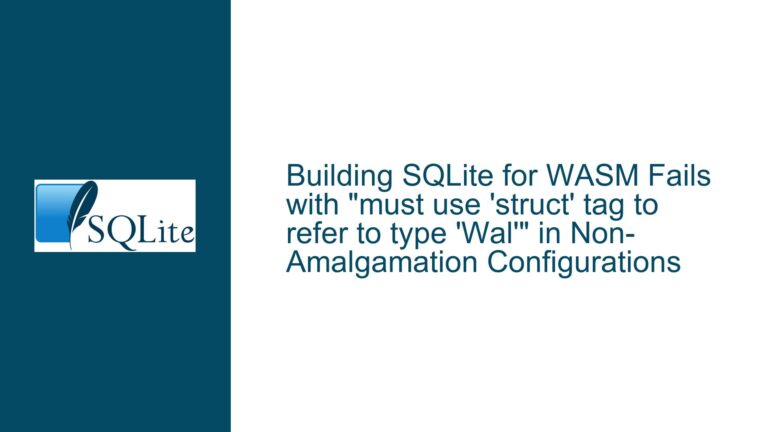Crash in sqlite3_open_v2 with SQLITE_HAS_CODEC and Uninitialized Memory Access
SQLite3_open_v2 Crash Due to Uninitialized Memory Access in databaseName Function
The core issue revolves around a crash occurring in the sqlite3_open_v2 function when the SQLITE_HAS_CODEC macro is defined, indicating the use of a custom encryption codec. The crash manifests in the databaseName function, which is part of the SQLite library. This function attempts to traverse backward through memory from a given pointer (zName) until it finds a sequence of four null bytes. However, the pointer zName is not properly initialized or validated, leading to access of uninitialized memory and subsequent application crashes.
The crash is particularly problematic because it occurs during the database opening process, which is a critical operation for any application relying on SQLite for data storage. The databaseName function is designed to work with filenames obtained from the SQLite Pager module, but in this case, the filename is passed directly through sqlite3_open_v2. This mismatch between the expected and actual source of the filename pointer results in undefined behavior.
The call stack reveals that the crash originates in the databaseName function, which is called by sqlite3_uri_parameter. This function, in turn, is invoked by sqlite3CodecQueryParameters, a function responsible for handling encryption-related parameters during database initialization. The sqlite3CodecQueryParameters function is called within openDatabase, which is the main function responsible for opening a database connection. The crash occurs because zName is not a valid pointer derived from the Pager module, leading to an attempt to access invalid memory locations.
Interrupted Write Operations Leading to Index Corruption
The crash is likely caused by a bug introduced in SQLite version 3.31.1, specifically within the sqlite3CodecQueryParameters function. This function is responsible for querying encryption parameters during the database opening process. The bug manifests when the databaseName function attempts to access memory locations before the start of the zName pointer, which is not guaranteed to be valid or initialized.
The root cause of the issue lies in the assumption that zName is always a valid pointer derived from the SQLite Pager module. However, when sqlite3_open_v2 is used directly, this assumption does not hold true. The databaseName function attempts to walk backward through memory from the zName pointer until it finds four consecutive null bytes. This operation is unsafe if zName is not a valid pointer or if the memory preceding zName is not properly initialized.
The issue is exacerbated by the fact that the SQLITE_HAS_CODEC macro is defined, indicating that a custom encryption codec is in use. The encryption codec introduces additional complexity to the database opening process, as it requires handling of encryption parameters. The sqlite3CodecQueryParameters function is responsible for this handling, but the bug in this function leads to the crash when zName is not a valid pointer.
The bug was introduced in SQLite version 3.31.1 and was subsequently fixed in later commits. However, the fix was not included in an official release at the time of the reported issue. This means that applications using SQLite 3.31.1 with a custom encryption codec are vulnerable to this crash unless they apply the patch manually or revert to an earlier version of SQLite.
Implementing PRAGMA journal_mode and Database Backup
To address the crash in sqlite3_open_v2 with SQLITE_HAS_CODEC, several troubleshooting steps and solutions can be implemented. The first and most immediate solution is to revert to SQLite version 3.31.0, which does not contain the bug. This can be done by downgrading the SQLite library used in the application. Reverting to an earlier version is a temporary workaround until the bug is fixed in an official release.
Another solution is to apply the patch that fixes the bug in sqlite3CodecQueryParameters. This patch modifies the function to properly handle the zName pointer, ensuring that it does not attempt to access uninitialized memory. The patch can be obtained from the SQLite source repository and applied manually to the SQLite library used in the application. This solution requires recompiling the SQLite library with the applied patch.
A more robust long-term solution is to wait for the next official release of SQLite that includes the fix for this bug. This ensures that the application is using a stable and officially supported version of SQLite. In the meantime, it is important to monitor the SQLite release timeline and update the application as soon as the fixed version is available.
In addition to these solutions, it is recommended to implement proper error handling and logging in the application to detect and diagnose similar issues in the future. This includes adding checks for invalid pointers and logging detailed information about the database opening process. Proper error handling can help identify and mitigate issues before they lead to application crashes.
Finally, it is important to ensure that the application is using the correct version of SQLite and that all dependencies are up to date. This includes verifying that the correct version of the SQLite library is linked and that any custom codecs or extensions are compatible with the version of SQLite being used. Regular testing and validation of the database opening process can help prevent similar issues from occurring in the future.
By following these troubleshooting steps and solutions, the crash in sqlite3_open_v2 with SQLITE_HAS_CODEC can be effectively addressed, ensuring the stability and reliability of the application.
